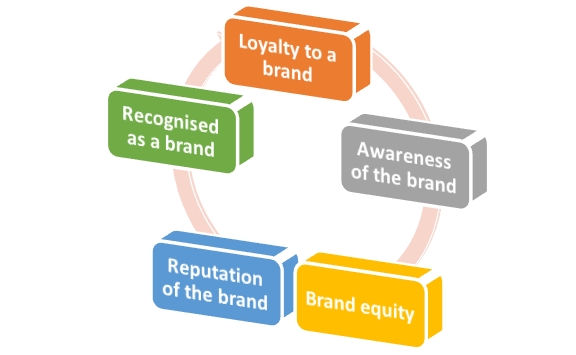What is brand management?
A marketing strategy that aims to enhance, maintain, and raise awareness of a brand's overall worth and prestige over time is called brand management. It employs a range of tactics and marketing material to strengthen its brand, market share, and value.
Companies need to be prepared to influence the market where customers make choices about brands in the blink of an eye. But, on the other hand, corporations will be successful or unsuccessful entirely based on their capacity to promote their brand efficiently.
Giving importance to brand management is the most important part of business development. For ongoing long-term brand growth and loyal consumers, its brand should be considered the leader in its sector.
Furthermore, a solid brand management strategy assists in the development and nurturing of better consumer relationships. As a result, a brand's reputation and related items will be seen more positively due to cultivating a loyal customer base, leading to increased revenue and higher brand equity.
Brand management controls both the intangible and tangible aspects of a brand. The tangibles in the context of a product brand are the products themselves, packaging, cost, and so on. The tangibles in the context of services brands refer to the customer's experience. Intangibles are emotional attachments to a service or goods.

Source: © Roberto1977 | Megapixl.com
Highlights
- A marketing strategy that aims to enhance, maintain, and raise awareness of a brand's overall worth and prestige over time is called brand management.
- Brand management controls both the tangible and intangible aspects of a brand.
- Corporations will be successful or unsuccessful entirely based on their capacity to promote their brand efficiently.
Frequently Asked Questions (FAQs)
What is brand management's process?
Managing a brand entails adhering to the brand's principles. By projecting a positive brand image, brands boost their market share and visibility.
Let's have a look at the brand management process. The creation of a brand takes a long time. However, once its accomplished, will continuously be maintained in an inventive and engaging manner.
Loyalty to a brand
The meaning of the term "brand loyalty" is very self-evident from the name. Building strong brand loyalty is crucial because consumers will share the message far and wide regardless of promotions. A good customer service department that emphasises satisfied customers can also be very beneficial.
Awareness of the brand
It is crucial to devote a lot of time and effort to raise brand awareness within the target audience. This is because the brand must reach an increasing number of consumers over time.
Brand equity
This refers to the brand's perceived worth among consumers over time. For example, people prefer brands on other common products because of their name recognition and popularity, even if the prices are much higher.
This is comparable to brand valuation, which refers to the market value of a firm's brand. A brand manager's task would be to develop brand equity over time and make it more meaningful.
Recognised as a brand
It is fundamental to figure out how to make the brand a household name among the general public. This can be accomplished by using a catchy tune in an advertisement, nice dialogue, or spectacular dance moves. Finding ways to recall a brand is critical because it is the first step towards creating a more significant and memorable brand.
Reputation of the brand
Working on a brand's reputation is one of a brand manager's most important responsibilities, as they must work hard to build a strong reputation for the brand that cannot be quickly shattered.

Source: Copyright © 2021 Kalkine Media
What are the functions of a brand manager?
Make business opportunities
In addition to overseeing marketing strategies and brand image, a brand manager is always on the lookout for new business opportunities to assist the firm to grow. In addition, they aid in determining price and product design depending on current market trends.
Create the brand's name and identity
Creating a brand logo and name is an essential component of a brand manager's job in a new entity. A brand manager must maintain the communications between the founding members and the creative group. As a result, a brand name that is both unique and appropriate can be chosen to reflect the firm's philosophy.
Consumer communication
A brand manager plays a critical role in keeping consumers satisfied by forging connections with them across multiple platforms and assisting the team in resolving difficult customer issues.

Source: © Vctstyle | Megapixl.com
Keep track of current and future market trends
A brand manager is required to monitor present and future market trends. This is anticipated to foster the growth of business and marketing strategies to maintain the firm's market position.
Budget management
A brand manager is solely responsible for determining the advertising and marketing budget as well as ensuring that all activities are carried out within the budget.
Interact with several departments
Every department plays a vital role in an organisation's growth. A brand manager's function is to connect with other departments and share information regarding market trends. It is necessary to share this information to make correct decisions.
Communication with top management
A brand manager is a key member of top management who provides crucial information regarding essential brand activities like marketing strategies, advertising campaigns, etc.
The brand manager also responds to top management's queries, and as the creative department's head, they deliver all of the innovative ideas to management.
Observing other brands' business strategies
Apart from concentrating on their company's brand, a brand manager must also track competitor firms' business strategies. This information is vital for a brand to compete with other brands. They can remain engaged in the market this way and can give a competitive edge to their rivals.
Maintain the brand's image
A brand manager is responsible for defending the brand's image and implementing various techniques to enhance the business's image and entice potential consumers. In addition, the brand manager oversees dealing with any market rumours about the brand and taking the necessary steps to put those rumours to rest.
 Please wait processing your request...
Please wait processing your request...